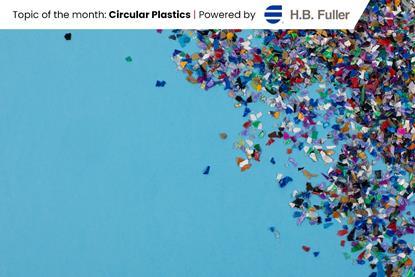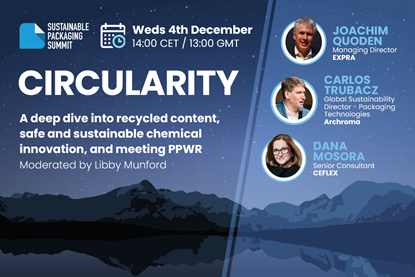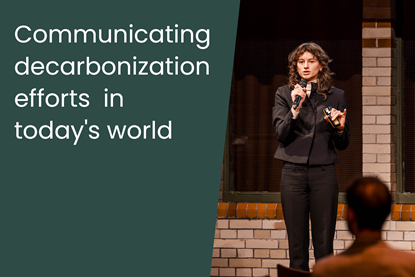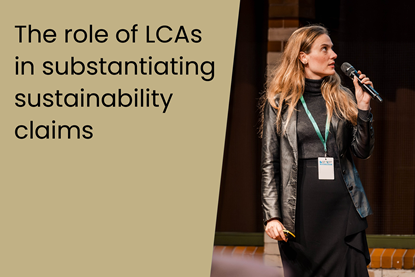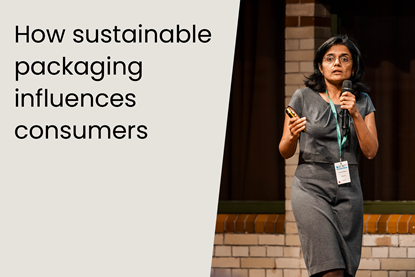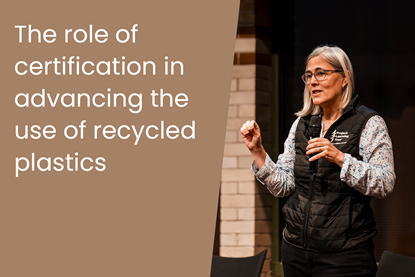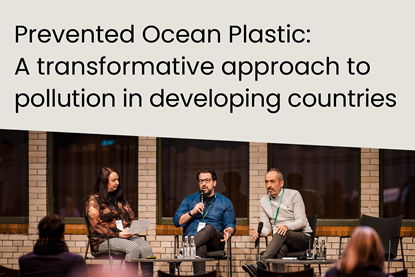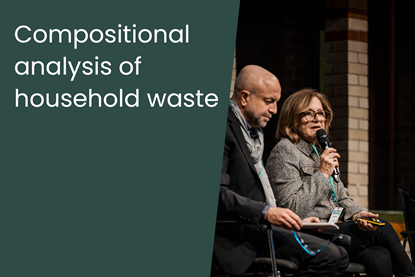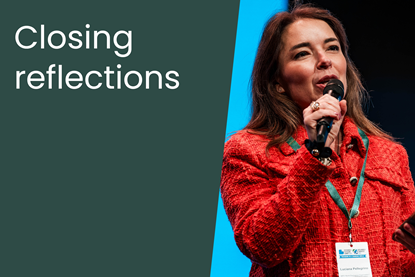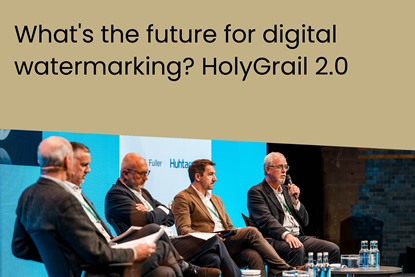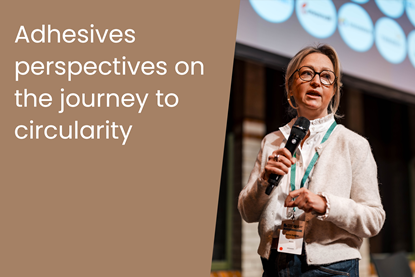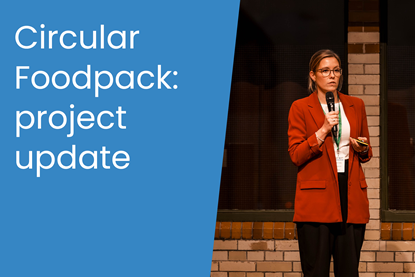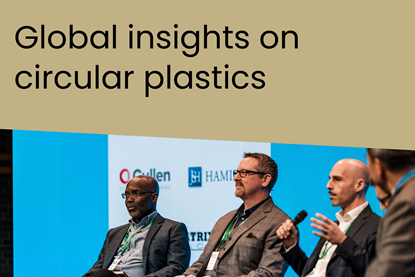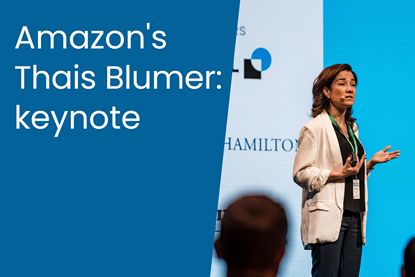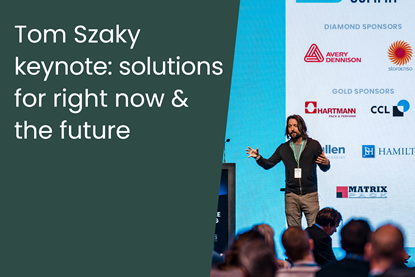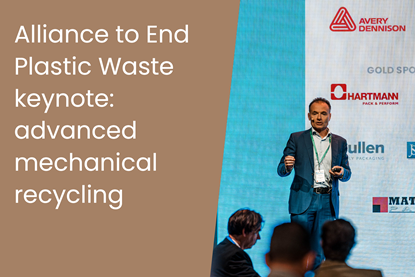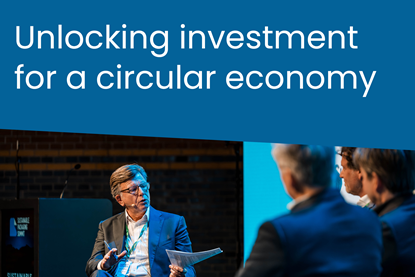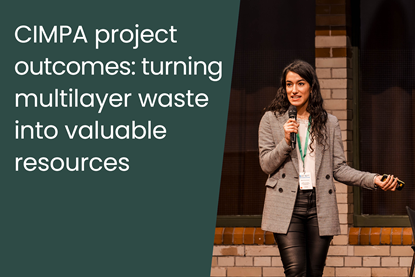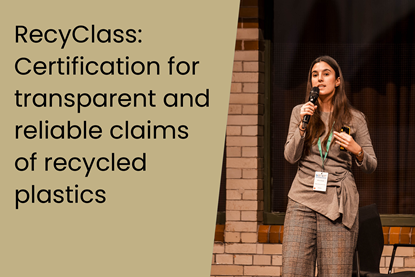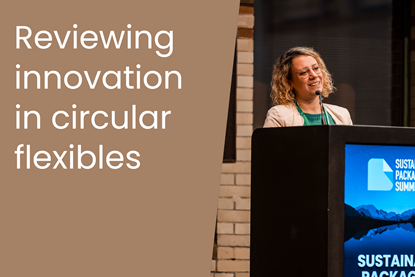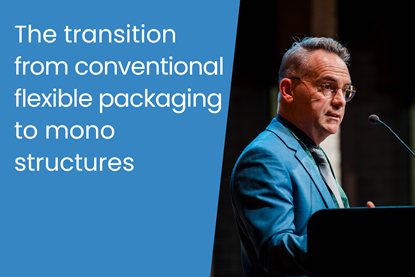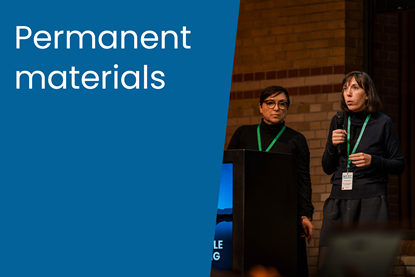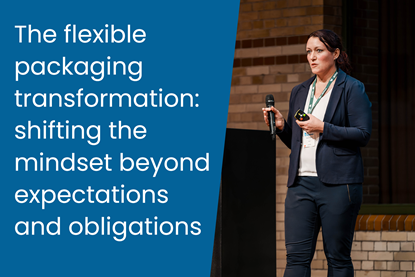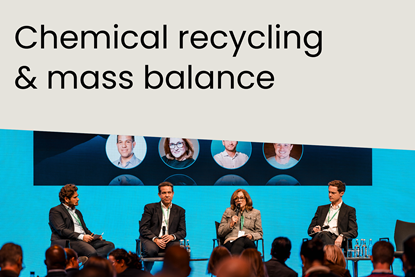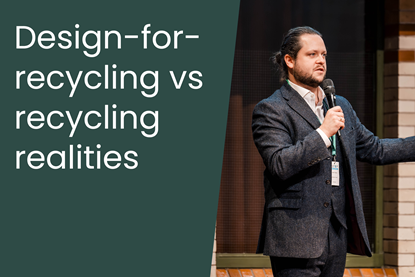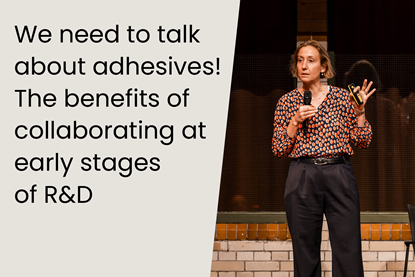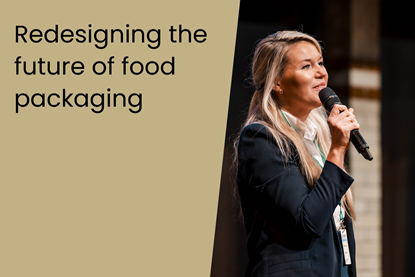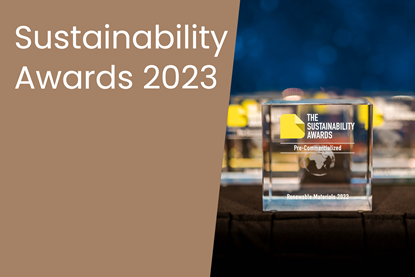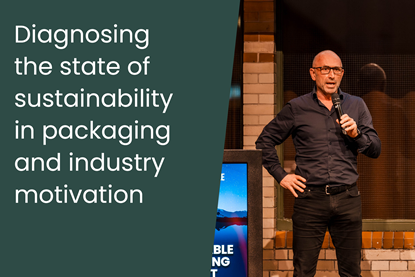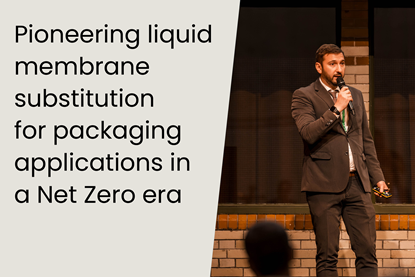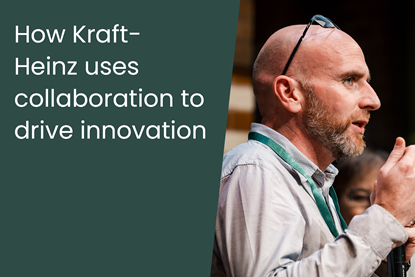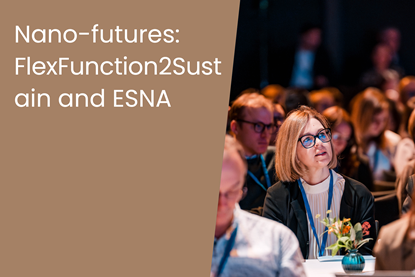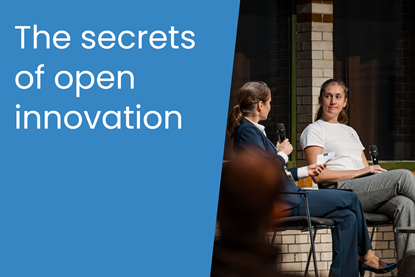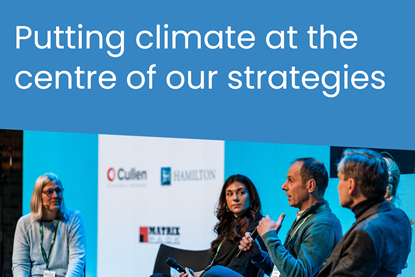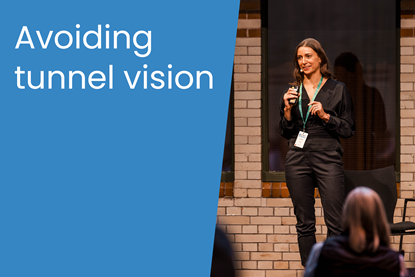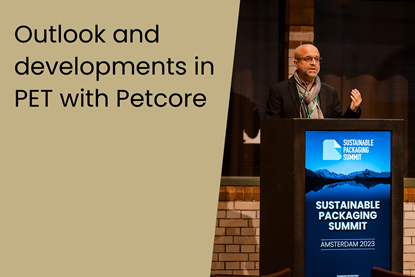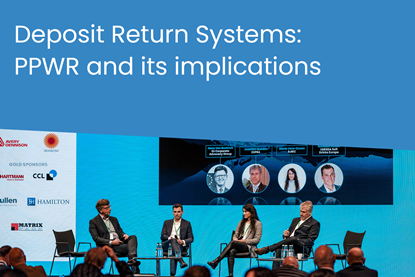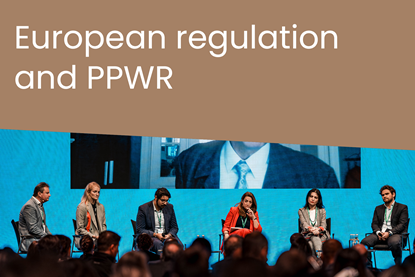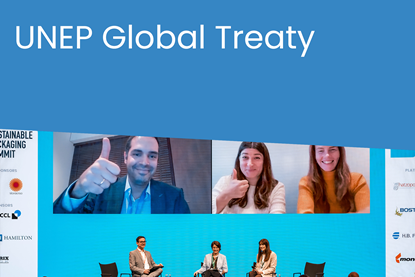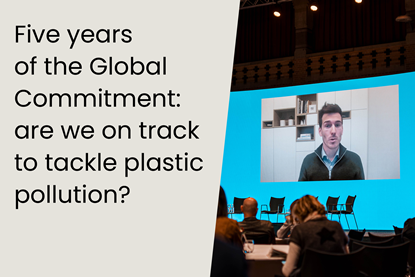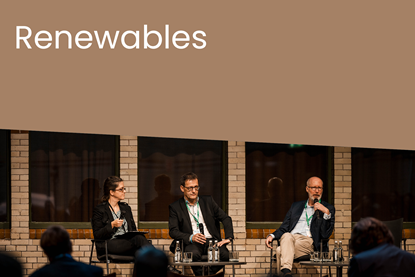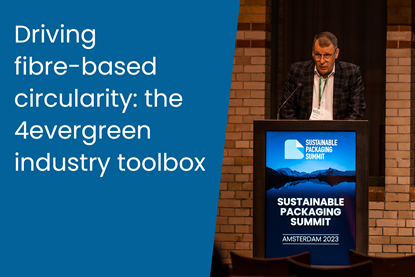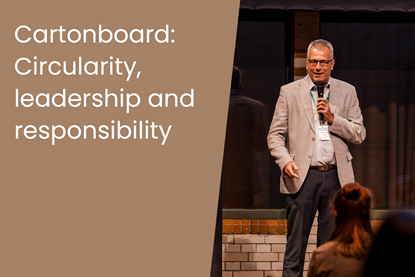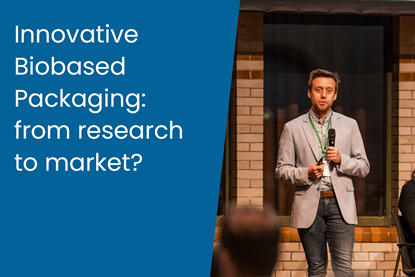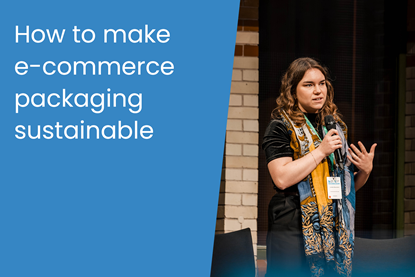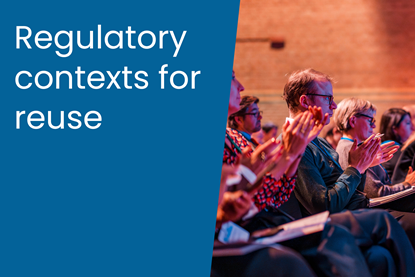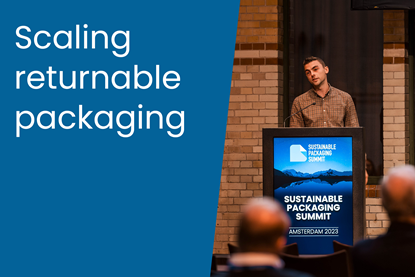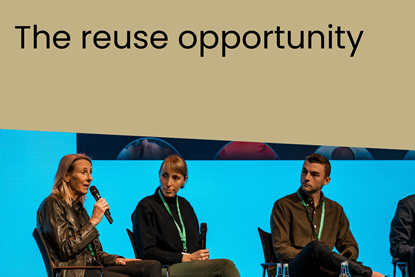
The cutting edge of sustainable packaging innovation
Taking place in Amsterdam at the end of last year, Packaging Europe’s Sustainable Packaging Summit brought together experts and thought leaders from across the packaging value chain to align strategically, learn, network, and create a critical mass to accelerate change.
Our 2023 Summit consisted of a number of high-level panel discussions and superstar keynotes. As a subscriber, you can watch recordings of all of these on-demand, anytime, anywhere. Simply scroll down this page and click on a thumbnail to get started.
Circular economy
Circular Plastics : Making positive inroads
However, according to a Plastics Europe report: circular plastics now account for 13.5% in new plastic products manufactured in Europe. This means that the European plastics system is halfway towards the interim ambition – established in the ‘Plastics Transition’ roadmap – to use 25% of plastics from circular sources in new products by 2030.
Circularity - LinkedIn LIVE Panel
In the latest LinkedIn Live panel of the year, as part of the Sustainable Packaging Summit 2024 series, we take a deep dive into the topic of Circularity.
We will be asking vital questions such as: What is the pivotal role of safe and sustainable chemical innovation? How do we meet PPWR targets? And what is the forecast for recycled content; how do we meet requirements; what technologies do we need to focus on and fund?Sustainable Packaging Summit: Communicating your decarbonization efforts confidently in today’s world
Vivien McKewen explores how has the carbon conversation has changed in recent years, and the implications, featuring insights from packaging manufacturers, FMCG companies and the end consumer. Finally, she explains: how to be F.A.C.T.U.A.L in your communication.
Sustainable Packaging Summit: The role of LCAs in substantiating sustainability claims
Barbar Dunin explores the value that life cycle analysis (LCA) can provide in supporting sustainability claims, amid increasing regulatory and consumer pressure to avoid greenwashing.
Sustainable Packaging Summit: How sustainable packaging influences consumers
Sustainable packaging trends like recyclable materials, minimalist packaging, and reusable pack design help manufacturers reduce waste and, in many cases, enhance brand perception. However, thoughtful execution is needed to maintain purchase motivation and brand consistency.
Sustainable Packaging Summit: The role of certification in advancing the use of recycled plastics
Chain of custody standards have used mass balance and book & claim systems to bring about change across a wide range of supply chains including renewable energy, responsible palm oil, sustainable forestry and more. In this session, we’ll learn how new standards are leveraging these proven methods to help advance the use of recycled plastics.
Sustainable Packaging Summit: Prevented Ocean Plastic: A transformative approach to pollution in developing countries
Marine plastic pollution is one of the most catastrophic manifestations of the environmental problems associated with packaging. Prevented Ocean Plastics is a new and, we believe, potentially transformative program that’s addressing the crisis in an innovative and scalable way. Raffi Schieir (Director of Prevented Ocean Plastic) and David Jakubovich (Director and Founder of JS&IC) tell us more about the initiative, its potential impacts, and their learnings to date.
Sustainable Packaging Summit: Compositional analysis of household waste
CEFLEX and Petcore have collaborated in large-scale research analysing the composition of post-consumer waste. Dana Mosora (CEFLEX) and Raphaël Jaumotte (Petcore) unpack the implications for efforts to drive up recycling rates in plastic packaging.
Sustainable Packaging Summit: Closing reflections
Key takeaways from the Sustainable Packaging Summit.
Sustainable Packaging Summit: HolyGrail 2.0: What’s the future for digital watermarking?
Having hosted the HolyGrail 2.0 member meeting on the previous day, the Summit gives a public platform to this ground-breaking collaboration to discuss the progress of the project, next steps, and the future of the Initiative in the context of an open, competitive market for facilitating a circular economy in packaging.
Sustainable Packaging Summit: Adhesives perspectives on the journey to circularity
Bostik’s Sylvie Despret assesses the impact of adhesives in enabling sustainability advancements in packaging, the latest technologies on the market, with the example of the Wash-off PSA Labels, and Laminating adhesives for flexible packaging, and, in the context of latest market trends and upcoming regulatory demands, the challenges that the next generation of adhesives will need to meet.
Sustainable Packaging Summit: Circular Foodpack project update
Fraunhofer IVV’s Nelly Freitag provides updates on the European Horizon 2020 project Circular Foodpack.
Sustainable Packaging Summit: Global insights on circular plastics
Pioneers of plastic recycling from Africa, Asia, North America and Europe discuss how different regions of the world can learn from each other’s experiences in developing a circular economy for plastics, how we can better support each other to drive circularity globally, and what kinds of international structures and harmonization could be beneficial.
Sustainable Packaging Summit: Keynote (Amazon’s Thais Blumer)
Speaker: Thais Blumer, Head of Sustainable Packaging Europe at Amazon
Sustainable Packaging Summit: Tom Szaky - solutions for right now and the future
Join us for a discussion with Tom Szaky, Founder & CEO of TerraCycle, and author of The Future of Packaging. Tom will pull back the curtain on how the current trends and models of production and consumption are driving challenges in sustainable packaging design and responsible waste management. He will also discuss why a collaborative approach - involving all actors in the supply chain - is crucial for driving the systematic changes we need to create a more circular future for packaging.
Sustainable Packaging Summit: Exploring the boundaries of advanced mechanical recycling
Nicholas Lelli explores the potential for mechanical recycling to become more efficient and produce more high-quality material. He we share examples of how technologies and initiatives that the Alliance to End Plastic Waste has gained experience with (e.g. ValueFlex for high quality recycling processes, digital watermarking and AI for advanced sorting, Quality of Recyclates standards for value chain alignment and demand creation, Waste decontamination for sensitive applications) can support this goal. Finally, he highlights the critical challenges the Alliance identifies in the context of upcoming legislation and existing infrastructure.
Sustainable Packaging Summit: Unlocking investment for a circular economy
This panel considers how strategic alignment between industry, investors, and EPR can remove roadblocks to a circular economy.
Plastics
Sustainable Packaging Summit: Turning multilayer plastic packaging waste into valuable resources - Outcomes of the CIMPA project
The CIMPA project proposes innovative solutions to develop the first value chain for the recycling of multilayer plastics from the food industry and agriculture. The latest developments of this EU-funded project will be presented, including the circularity-by-design guidelines, the innovative sorting techniques, mechanical and physical recycling as well as upgrading solutions.
Sustainable Packaging Summit: RecyClass: Certification for transparent and reliable claims of recycled plastics
Miereia Boada of Plastics Recyclers Europe updates us on certification.
Sustainable Packaging Summit: Reviewing innovation in circular flexibles
Sustainable Packaging Summit: Reviewing innovation in circular flexibles
Sustainable Packaging Summit: Insights on the transition from conventional flexible packaging to mono structures for a circular economy
Insights on the transition from conventional flexible packaging to mono structures for a circular economy.
Sustainable Packaging Summit: Permanent materials
In this session, we’ll hear from FEVE and Metal Packaging Europe on the sustainability perspectives and roadmaps of glass and metal packaging, respectively - and then the two associations will join in dialogue on the joint outlook for permanent packaging materials in the face of rising demand for sustainability.
Sustainable Packaging Summit: The flexible packaging transformation – shifting the mindset beyond expectations and obligations
The shift towards sustainable solutions in flexible packaging is no longer a choice but an imperative driven by legislation, costs, and evolving consumer expectations. In this field of tensions, argues Wipak’s Susan Janssen, it is even more important to take everybody on board on that path, consumer, customer, and employees likewise. It’s not just a change in materials; it’s a shift in mindset.
Sustainable Packaging Summit: Chemical recycling & mass balance
The position of chemical recycling in our recycling ecosystem is much discussed - and by some fundamentally rejected. In this panel we scrutinise the strategic role of advanced recycling, its environmental impacts, and the associated and equally controversial question of mass balance accounting.
R&D
Sustainable Packaging Summit: Design-for-recycling vs recycling realities
Recycling expert Julian Thielen explores the disconnect between the capabilities of sorting plants built for multiwall packaging and the new generations of downgauged and mono substrates. Highlighting challenges for sorting and recycling that arise from packaging design, Julian points to possible future solutions.
Sustainable Packaging Summit: We need to talk about adhesives! The benefits of collaborating with adhesive suppliers at early stages of packaging R&D
Regulatory demands and the multiple, ever-evolving design for recycling guidelines make the development of sustainable packaging a complex task. Elizabeth Staab of HB Fuller explores the role of adhesives as an enabler of circular packages, and explains the importance of including adhesive suppliers in the early stages of packaging R&D.
Sustainable Packaging Summit: Redesigning the future of food packaging
Redesigning the future of food packaging
Sustainable Packaging Summit: Sustainability Awards ceremony
At the Sustainable Packaging Summit in Amsterdam, the winners of this year’s Sustainability Awards, the most prestigious global competition for sustainable packaging innovation, were announced. Click here to watch the full ceremony and hear from all the winners!
Sustainable Packaging Summit: Diagnosing the state of sustainability in packaging and industry motivation
Diagnosing the state of sustainability in packaging and industry motivation
Sustainable Packaging Summit: Pioneering liquid membrane substitution for packaging applications in a Net Zero era
Sustainable Packaging Summit: Pioneering liquid membrane substitution for packaging applications in a Net Zero era
Sustainable Packaging Summit: How Kraft-Heinz uses collaboration to drive innovation
Innovation leaders from Kraft Heinz share their learnings from the sustainable packaging innovation process, in particular how leveraging internal and external partnerships can accelerate bringing innovation to market.
Sustainable Packaging Summit: Nano-futures - FlexFunction2Sustain and ESNA
This presentation reviews the work of the FlexFunction2Sustain project, with the goal of creating an Open Innovation Test Bed for nano-functionalisation technologies that enable sustainable and smart plastics and paper-based products, and introduces the new European Sustainable Nanotechnology solutions Association (ESNA) which aims to transform innovative ideas into products.
Sustainable Packaging Summit: The secrets of open innovation
Collaborators from the distinct worlds of of brand owner (Beiersdorf’s Janina Zippel), investor (Fredric Petit from Emerald) and start-up (DePoly’s Samantha Anderson) discuss the teachable insights from their partnership on how to harness open innovation.
Sustainable Packaging Summit: Putting climate at the centre of our strategies
The climate crisis poses a profound threat to human civilization. Our opening panel explores the implications of putting Net Zero at the centre of our sustainability strategies.
Regulation
Sustainable Packaging Summit: Avoiding tunnel vision
What does it take to make packaging truly sustainable? And how do we avoid focusing on only one aspect of sustainability while managing complexity and possible trade-offs?
Sustainable Packaging Summit: Outlook and developments in PET with Petcore
Petcore’s Raphaël Jaumotte shares latest developments in PET packaging. He will share Petcore’s activities and the objectives behind key projects that are structuring the PET industry, including digitalized platform for laboratories with the target to gather data on NIAS, depolymerization recycling for PET, and functional barrier.
Sustainable Packaging Summit: Deposit Return Systems - PPWR and its implications
In this panel you’ll hear from experts who are directly involved in deposit return schemes, and learn more about where they stand and what solutions they propose.
Sustainable Packaging Summit: European regulation and PPWR
The autumn of 2023 is a pivotal moment for the European regulatory landscape and the shaping of the PPWR. We hear from Brussels and Brussels watchers about the key tensions and imperatives.
Sustainable Packaging Summit: UNEP Global Treaty
As INC-3 takes place in parallel with the Summit in Nairobi, the Global Treaty on Plastic Pollution could not be more topical. Our panel of speakers from the corporate, NGO and academic sectors discuss the desired outcomes of the UNEP treaty discussions, and the strategic implications for the value chain.
Sustainable Packaging Summit: Is the world on track to tackle plastic pollution? Reflecting on five years of the Global Commitment
Sander Defruyt shares the state of play, five years since the Ellen MacArthur Foundation’s launch of the Global Commitment: the progress that has been made, where our current trajectory falls short, and the levers available to get on course to eliminate plastic pollution.
Sustainable Packaging Summit: Fireside chat with P&G’s Chief Sustainability Officer
P&G’s Chief Sustainability Officer frames the Summit with her unique, strategic insights. Encompassing P&G’s high-level goals and progress and burrowing into the specifics of how this global brand owner is adapting its packaging specifications, systems and R&D to drive sustainability.
Renewables
Sustainable Packaging Summit: Renewables
Assessing the strategic opportunity for renewable packaging materials.
Sustainable Packaging Summit: Driving fibre-based packaging circularity - The 4evergreen industry toolbox
Sustainable Packaging Summit: Driving fibre-based packaging circularity - The 4evergreen industry toolbox
Sustainable Packaging Summit: Cartonboard: Circularity, leadership and responsibility
ProCarton’s Winfried Mühling shares a fibre-based approach to what it takes to be a leader in circularity in the context of the EU Green Deal, emphasising the need for cross-industry and cross-substrate collaboration. Winfried also shares results of latest consumer studies.
Sustainable Packaging Summit: Innovative Biobased Packaging - from research to market?
Insights into the latest research developments and on the upscaling of novel biobased, recyclable packaging materials for food contact.
Reuse
Sustainable Packaging Summit: How to make e-commerce packaging sustainable
Sustainable Packaging Summit: How to make e-commerce packaging sustainable
Sustainable Packaging Summit: Regulatory contexts for reuse
Sustainable Packaging Summit: Regulatory contexts for reuse.
Sustainable Packaging Summit: Scaling returnable packaging
Mark Buckley, Strategic Design Manager at the Ellen MacArthur Foundation will provide a glimpse of their new study, launching in November, that envisions and models future scaled reuse systems. Their findings show that to scale reuse, we need to design and build systems with a new approach that is truly collaborative.
Sustainable Packaging Summit: The reuse opportunity
This eminent panel explores the opportunities and limitations of reuse models, and considers the strategies that can accelerate adoption






